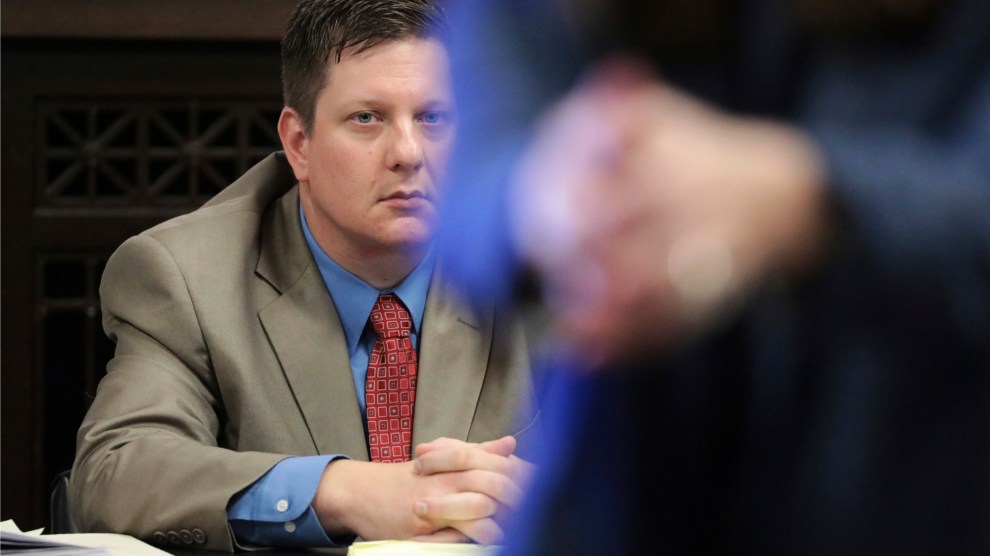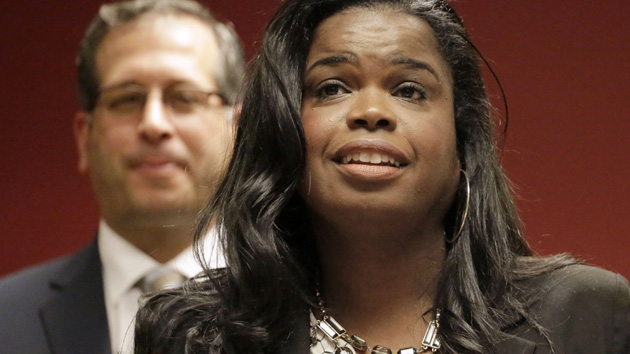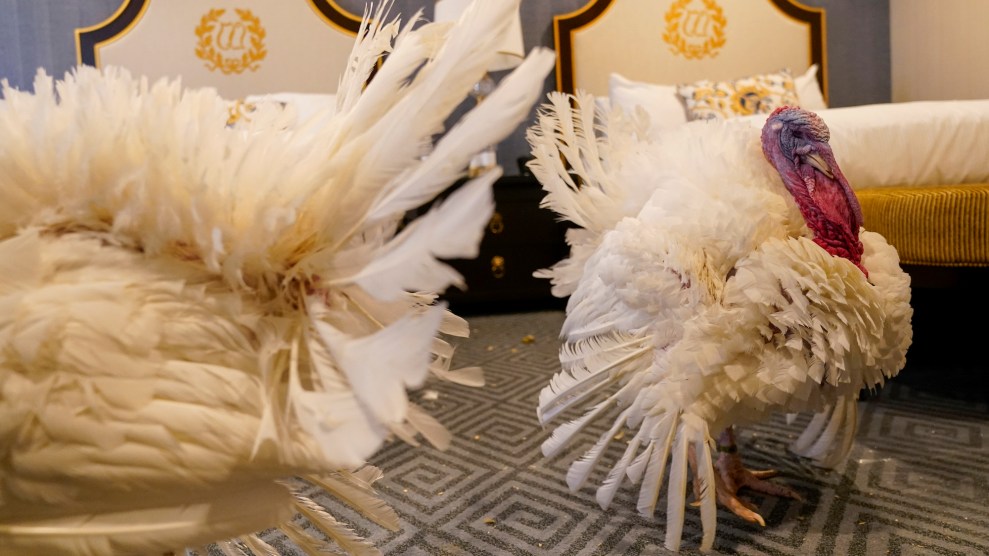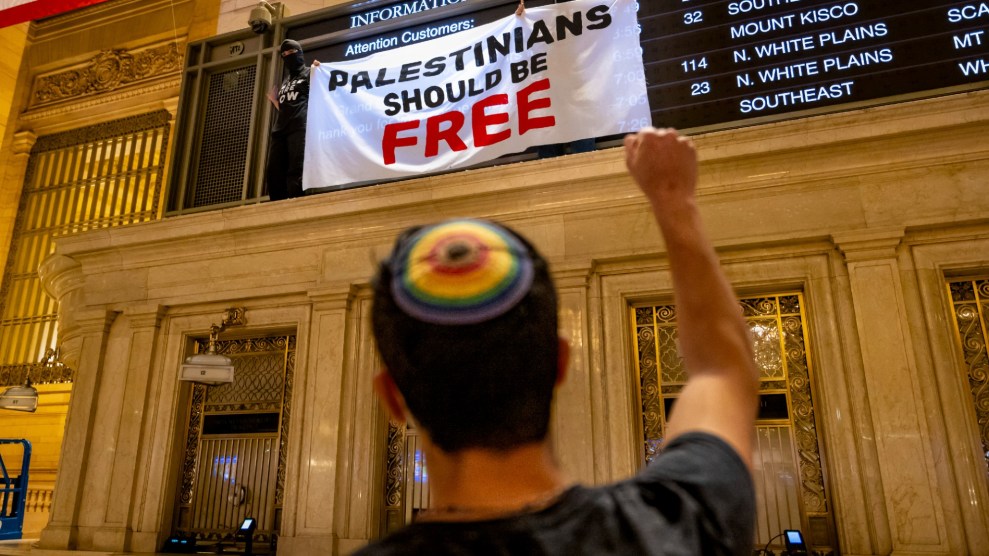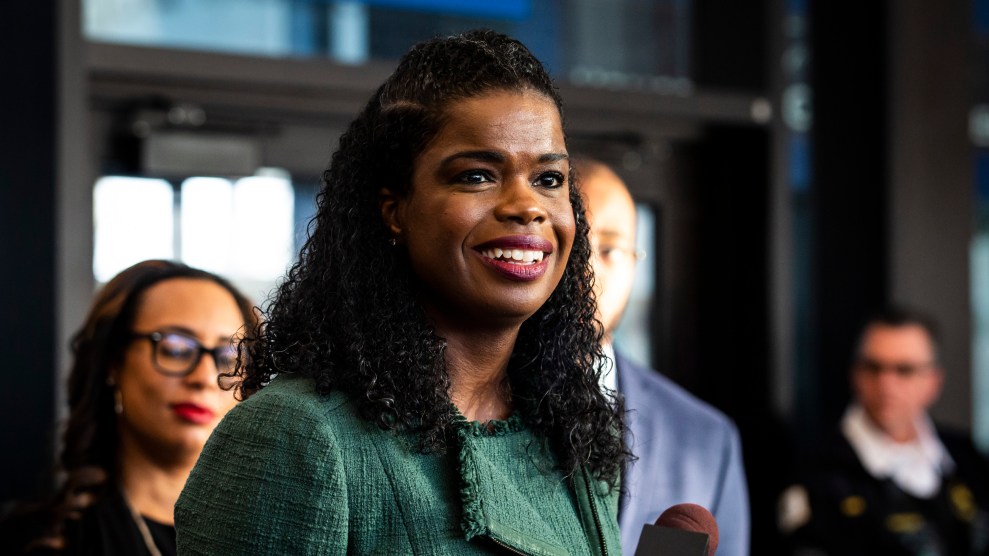
Cook County State's Attorney Kim Foxx speaks during a press conference after filing motions to vacate more than 1,000 cannabis convictions in 2019. Ashlee Rezin Garcia/Chicago Sun-Times via AP
When former Empire actor Jussie Smollett entered a Chicago courtroom in late February, it may have felt like déjà vu. In 2019, Smollett made headlines after it came to light that he allegedly paid masked men to attack him and tie a noose around his neck, and then filed a false police report. Prosecutors dropped all charges against the actor after he paid a fine and did community service. But a year later, after his case was reopened, here he stood again—pleading not guilty to the same offense of staging a racist, homophobic hate crime against himself.
This time, Smollett is not the only one on trial. His case has cast a dark cloud over the reelection campaign of Kim Foxx, the first Black woman to serve as the chief prosecutor in Cook County. Foxx’s office chose last year to drop the charges against Smollett, in keeping with its overall strategy of sending fewer nonviolent offenders to prison. The move triggered a barrage of vitriol from President Trump and other critics who suggested the office unfairly let the actor off the hook because of his wealth and connections. Foxx later saw her judgment questioned—and reversed—when a local judge made the exceedingly rare move of appointing an outside “special” prosecutor to reexamine the case.
A few weeks ahead of the March 17 primary, with Smollett back in court, Foxx watched her poll numbers slip amid a wave of renewed backlash. Her challengers in the primary urged her to resign. “This race is not about one case,” Foxx pleaded during a Democratic candidates’ debate. She begged voters to consider her broader record, such as the time her office secured a conviction against a police officer who shot an unarmed Black teen 16 times. And she questioned the “James Comey-like timing” of Smollett’s new charges, a reference to the former FBI director’s decision to reopen an investigation of Hillary Clinton’s emails before the 2016 presidential election.
Why has Foxx faced so much vitriol for this case? It could be because a celebrity is involved. After news of the supposed attack went viral, and before police accused him of staging it, Smollett, who had previous roles in The Mighty Ducks and Alien: Covenant, saw an outpouring of support from fans and politicians. Or maybe people are angry with Foxx because she made some legitimate mistakes by not being more transparent with such a high-profile case. She admitted she did not communicate very clearly about why her office dropped the charges against Smollett, or why she allowed her deputy to manage the litigation instead of managing it herself.
But there’s another factor to consider: Black progressive women elected as chief prosecutors often encounter double standards as they handle cases like Smollett’s. And many of them say they face scrutiny for their decisions that white or male prosecutors don’t endure. “What her office did in this case is not different than what we see reform prosecutors do across this country,” says Jamila Hodge, a former federal prosecutor who now works at the Vera Institute of Justice. “We only see this happening because of who she is.”
Prosecutors are arguably the most powerful, least regulated actors in the legal system, with typically unreviewable discretion around what charges to file and what plea deals to make with defendants. Every day around the country, these attorneys dismiss cases behind closed doors, without giving a reason. Normally, a prosecutor’s decision on a case is the last word.
That a Chicago judge appointed a special outside lawyer to review the work that Foxx’s office had already finished was “unprecedented,” Hodge says. Paul Butler, a former prosecutor who is now a law professor at Georgetown, says it was straight-up “bizarre.” “It’s only very recently and significantly in the case of progressive prosecutors who are African American women that we’re seeing these extraordinary legal maneuvers to take power away,” he argues.
Black women have increasingly run for state’s attorney or district attorney seats in the past several years, some of them as a part of a progressive movement to put reform-minded people at the helm of traditionally tough-on-crime offices. Foxx is not the only one of those who were elected to face harassment or see their discretion tested in strange ways—often by white police officers, judges, and politicians.
Kim Gardner, the first Black chief prosecutor in St. Louis, has received letters calling her the n-word, a “bitch,” and a “cunt,” and was described as a “menace” by a police union spokesman. When her office investigated then-Gov. Eric Greitens over allegations of sexual misconduct, the police petitioned a court to appoint a special prosecutor who charged one of her investigators with perjury and got a search warrant to seize the server with her office’s emails. (Gardner later dropped the charges against the governor, who resigned.)
In January, Gardner filed a lawsuit accusing her city of a racially motivated conspiracy to push her out of office and block her attempts to make the legal system fairer for minorities. “Gardner was elected in 2016 on a promise to redress the scourge of historical inequality and rebuild trust in the criminal justice system among communities of color,” her lawsuit states. “Unfortunately, entrenched interests in St. Louis…have mobilized to thwart these efforts through a broad campaign of collusive conduct, including the unprecedented appointment of an ethically conflicted Special Prosecutor…and a patently overbroad and unconstitutional ransacking of the office’s electronic files.” She is up for reelection this year, with a primary in August.
In Orlando, Aramis Ayala, the first Black district attorney in Florida, saw some of her powers removed by the governor in 2017 after she decided to stop seeking the death penalty. Then-Gov. Rick Scott made the unusual decision to issue an executive order preventing her office from handling a case in its jurisdiction involving a murdered police officer; he assigned it and 22 other capital cases to a prosecutor in another county instead. A month later, Aramis received a noose in the mail.
Last September, Rachael Rollins, Boston’s first elected Black woman prosecutor, asked a court to dismiss the charges against nonviolent protesters who opposed a “straight pride” parade; a local judge refused. “The actions of Judge Richard Sinnott are unprecedented and outrageous,” Rollins said in a statement as she petitioned for help from a higher court, which eventually sided with her. By then, Rollins was perhaps accustomed to unusual legal pushback: The National Police Association filed an ethics complaint against her before she even took office, arguing that her campaign promises to reduce the prison population by not charging people for some minor crimes constituted a “reckless disregard for the laws.” Carissa Byrne Hessick, a law professor at the University of North Carolina who directs the Prosecutors and Politics Project, described the complaint as “very odd.”
After Marilyn Mosby, a Black chief prosecutor in Baltimore, flew to St. Louis in a show of support for Gardner’s lawsuit, she got a voicemail from a caller in Illinois who accused her of hating police and white people. “If we’d known you all were gonna be this much fucking trouble we would’ve picked our own fucking cotton,” the caller said. Mosby had been sued by police after she tried to prosecute officers for the death of Freddie Gray, who fell into a coma in a police van in 2015. Filing a lawsuit against a prosecutor is “essentially unheard of,” according to the Marshall Project, a criminal justice-focused news organization. A judge let the suit proceed; the Supreme Court later sided with Mosby.
And Foxx, too, has faced explicitly racist threats. After her office dropped the charges against Smollett, several members of groups linked to white nationalists—including the Proud Boys, the American Guard, and the American Identity Movement—showed up at a protest organized by a police union.
What makes these incidents even more extraordinary is the fact that Black women constitute less than 1 percent of all elected prosecutors in the United States; most district attorneys and state’s attorneys are white men. “The most important question is whether a black woman prosecutor is allowed to do her job and exercise the same power and discretion that other prosecutors enjoy,” Butler wrote in a recent op-ed, which examined Foxx’s case. “A prosecutor’s discretion is something that’s usually considered sacred,” says Hodge. “It’s only when those decisions are being made by Black women in this role, and when they’re done to the benefit of populations who have been traditionally marginalized and harmed by the system, that now prosecution’s discretion is a problem.”
That’s not to say that other reform-minded prosecutors don’t face pushback. In Philadelphia, District Attorney Larry Krasner, who is white, has also seen politicians go to extreme lengths to reduce his discretion. But the blowback against Krasner tends to focus on his policy choices, not his identity. “The disrespect would look different if I looked different. It’s extremely personal,” Mosby told the Marshall Project in January when she flew to St. Louis to show support for Gardner’s lawsuit. “The first thing they come at when you’re a Black woman is your competency.”
Foxx, who leads the country’s second-biggest prosecutor’s office, has been endorsed by Chicago Mayor Lori Lightfoot, Sens. Bernie Sanders and Elizabeth Warren, Rep. Ayanna Pressley, Krasner, and other big-name progressives. But her challengers are quick to question her abilities. “The sheer embarrassment of her incompetence and all that is [sic] has cost Cook County in terms of delayed justice, lost respect, and hundreds of thousands of dollars more in taxpayer money spent on a case because of her actions should be enough for her to leave office,” Bob Fioretti, a former Chicago alderman running to unseat her, said in February, referring to the Smollett case.
Foxx’s biggest challenger, Bill Conway, a Navy veteran and former assistant state’s attorney whose billionaire father has donated $10 million to his campaign, has also questioned her judgment on the case. In one television ad, as an image of Smollett appears onscreen, Conway says, “I’ll end the special treatment for the rich and well-connected.” In another ad, his campaign suggests that Foxx showed little mercy for other people of color. The ad features features Candace Clark, a young black woman who was also accused of submitting a false report to Chicago police. With “Jussie Smollett, she cared,” Clark tells viewers, “but when it came to Candace Clark: “Kim Foxx did not care at all.”
Foxx admits she made mistakes handling the Smollett litigation. She waffled on justifying her recusal from the case; first she said it was because she’d spoken with one of Smollett’s family members when Smollett was still assumed to be a victim. But later she said it was because of false rumors that she herself was related to the Empire actor. Butler, the Georgetown professor, who is a former prosecutor, doesn’t think these errors necessitate the vitriol that Foxx has faced. “In a big city like Chicago, you’re literally prosecuting hundreds and thousands of cases a year. And it’s just like any other part of the criminal legal system: Sometimes mistakes will be made,” he says. “What’s unusual about this case isn’t that a prosecutor could have done some things better. What’s unusual about this case is the vehemence of the reaction against Ms. Foxx.”
To suggest that Foxx helped Smollett but neglected low-income people and minorities in the legal system—as the Conway ad implied—is also a stretch of the imagination, he says. Under her tenure, the number of African Americans and Latinos sent to prison has dropped by a third, partly because her office has declined to prosecute thousands of low-level cases, like for drug possession or shoplifting, that her predecessor pursued. “The status quo does not die easy,” says Hodge, adding that Foxx’s critics may be weaponizing the Smollett case to thwart these reforms. “When you have everyone from the highest levels of our government making comments and coming after her, that’s because she’s actually having that impact.”
“Her enemies and those who have been against her from the moment she ran and won on a reform platform—they were waiting for a misstep,” she adds. “They were waiting for something they could use to come after her, because they never wanted her in the position in the first place.”

